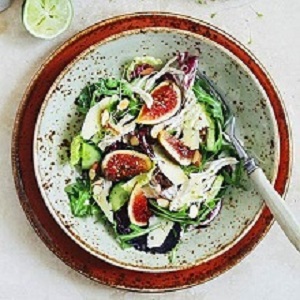 Following a Mediterranean diet could help reduce the risk of contracting one of the worst types of breast cancer by 40%, according to a large study for the World Cancer Research Fund.
Following a Mediterranean diet could help reduce the risk of contracting one of the worst types of breast cancer by 40%, according to a large study for the World Cancer Research Fund.
The Mediterranean diet, which is rich in olive oil, fish, fruit, nuts, vegetables and wholegrains, has well-publicised benefits, including reducing the risk of stroke and heart disease. The study suggests it could also significantly reduce the chances of women getting oestrogen-receptor-negative (ER-negative) breast cancer, a post-menopausal form of the disease that cannot be treated with hormone therapy.
The Guardian reports that the study’s lead researcher, Professor Piet van den Brandt of Maastricht University in the Netherlands, said: “Our research can help to shine a light on how dietary patterns can affect our cancer risk.
“We found a strong link between the Mediterranean diet and reduced oestrogen-receptor-negative breast cancer risk among postmenopausal women, even in a non-Mediterranean population. This type of breast cancer usually has a worse prognosis than other types of breast cancer.”
The reports says the researchers examined 62,573 women aged 55 to 69 over two decades. They were all participants in the Netherlands Cohort Study examining diet and cancer, which began in 1986. Their diets were tracked to see how closely they followed the Mediterranean pattern, which also has a low intake of red meat, sweets and refined grains such as white bread or white rice.
Traditionally it includes moderate consumption of alcohol, but because alcohol is a known risk factor for breast cancer this was excluded from the study. Almost 12,000 cases of breast cancer could be prevented in the UK each year if nobody drank alcohol, previous research has suggested.
Of the women included in the study, 3,354 contracted breast cancer, but 1,033 of the cases were not included in the analysis because the women had a history of breast cancer and/or had incomplete or inconsistent dietary data. The analysis looked at the different components of the Mediterranean diet individually, concluding that nut intake was most strongly inversely associated with ER-negative breast cancer, followed by fruit and fish.
The researchers concluded that, assuming causality, if everyone ate the highest defined Mediterranean diet, around a third (32.4%) of ER-negative breast cancer cases and 2.3% of all breast cancer cases could be avoided.
They said their findings were confirmed in a meta-analysis of cohort studies.
Dr Panagiota Mitrou, director of research funding at the World Cancer Research Fund, is quoted in the report as saying it was an important study. “With breast cancer being so common in the UK, prevention is key if we want to see a decrease in the number of women developing the disease,” he said. “We would welcome further research that helps us better understand the risk factors for the different breast cancer subtypes.”
Emma Pennery, clinical director at Breast Cancer Care, described the latest research as “intriguing”. She said: “We know how devastating a diagnosis is and this study adds to evidence that a healthy diet, full of ‘good’ low-saturated fats, plays a part in lowering risk of the disease.
“However, it’s important to remember while lifestyle choices like eating a well-balanced diet and taking regular exercise can help reduce the risk of cancer, they don’t guarantee prevention. So it’s crucial women know the signs and symptoms of breast cancer, and contact their GP with any concerns.”
The report says people who have heart disease are already recommended to follow a Mediterranean diet in the UK. Public Health England has said the Mediterranean diet is similar to the official UK advice, which recommends cutting back on sugary, fatty and salty food and drinks.
Abstract
The Mediterranean Diet (MD) has been associated with reduced mortality and risk of cardiovascular diseases, but there is only limited evidence on cancer. We investigated the relationship between adherence to MD and risk of postmenopausal breast cancer (and estrogen/progesterone receptor subtypes, ER/PR). In the Netherlands Cohort Study, 62,573 women aged 55–69 years provided information on dietary and lifestyle habits in 1986. Follow-up for cancer incidence until 2007 (20.3 years) consisted of record linkages with the Netherlands Cancer Registry and the Dutch Pathology Registry PALGA. Adherence to MD was estimated through the alternate Mediterranean Diet Score excluding alcohol. Multivariate case–cohort analyses were based on 2,321 incident breast cancer cases and 1,665 subcohort members with complete data on diet and potential confounders. We also conducted meta-analyses of our results with those of other published cohort studies. We found a statistically significant inverse association between MD adherence and risk of ER negative (ER−) breast cancer, with a hazard ratio of 0.60 (95% Confidence Interval, 0.39–0.93) for high versus low MD adherence (ptrend = 0.032). MD adherence showed only nonsignificant weak inverse associations with ER positive (ER+) or total breast cancer risk. In meta-analyses, summary HRs for high versus low MD adherence were 0.94 for total postmenopausal breast cancer, 0.98 for ER+, 0.73 for ER− and 0.77 for ER − PR− breast cancer. Our findings support an inverse association between MD adherence and, particularly, receptor negative breast cancer. This may have important implications for prevention because of the poorer prognosis of these breast cancer subtypes.
Authors
Piet A van den Brandt, Maya Schulpen
[link url="https://www.theguardian.com/society/2017/mar/06/mediterranean-diet-may-reduce-risk-of-form-of-breast-cancer-study"]The Guardian report[/link]
[link url="http://onlinelibrary.wiley.com/doi/10.1002/ijc.30654/full"]International Journal of Cancer abstract[/link]
